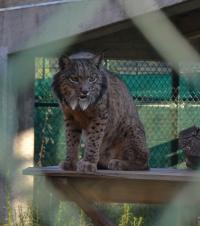
The most endangered felid species, the Iberian lynx (Lynx pardinus), is the reason why breeding centres were created around the Iberian Peninsula, hoping to reverse its population decline. This study was conducted in Centro Nacional de Reprodução do Lince Ibérico, in Portugal, and aimed at investigating the effects a synthetic analogue of Cat Appeasing Pheromone (CAP) on the behaviour of 4 captive male lynx. The 2 months’ study was divided into Baseline and Treatment periods. During the latter, the control group was exposed to a placebo and the treatment group to CAP. The treatments were applied on a daily basis, and observations were conducted for two hours in the morning. The results showed a significant decrease of stereotypic behaviours in the treatment group. The periods prior to and after the experimental study were analysed to assess potential pre- and post-experimental study effects. Both groups showed a significant increase of stereotypic behaviours during the post-experimental period, which may be due to the relocation of the males after the experimental study, in order to pair them with females for breeding. Despite the small sample, the results confirm that CAP reduces stereotypies, and is a useful tool to enhance welfare in captive lynx. This study shows that pheromonotherapy is a promising way of providing environmental enrichment for captive animals.
Responsible for this page:
Director of undergraduate studies Biology
Last updated:
05/03/16
